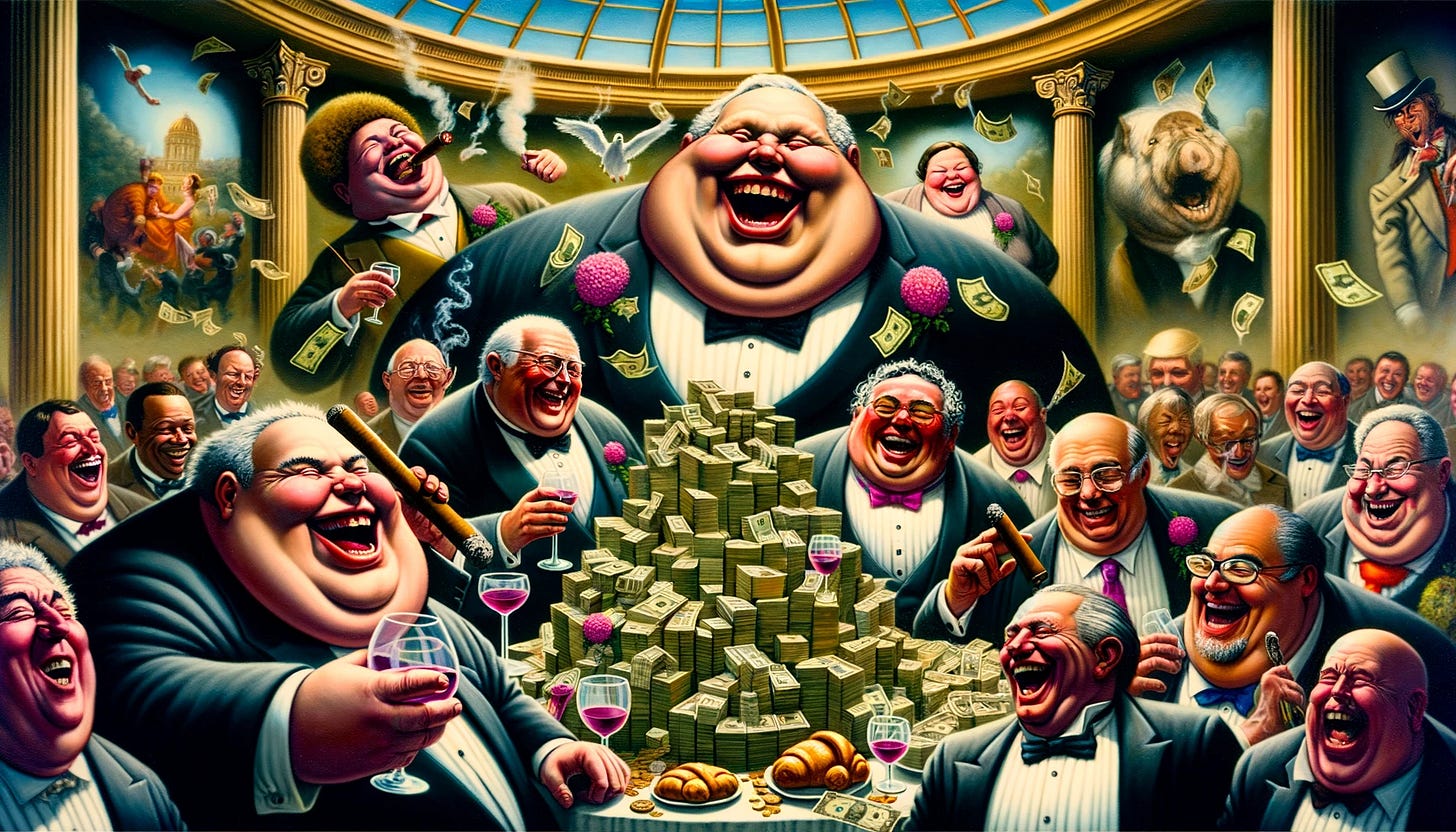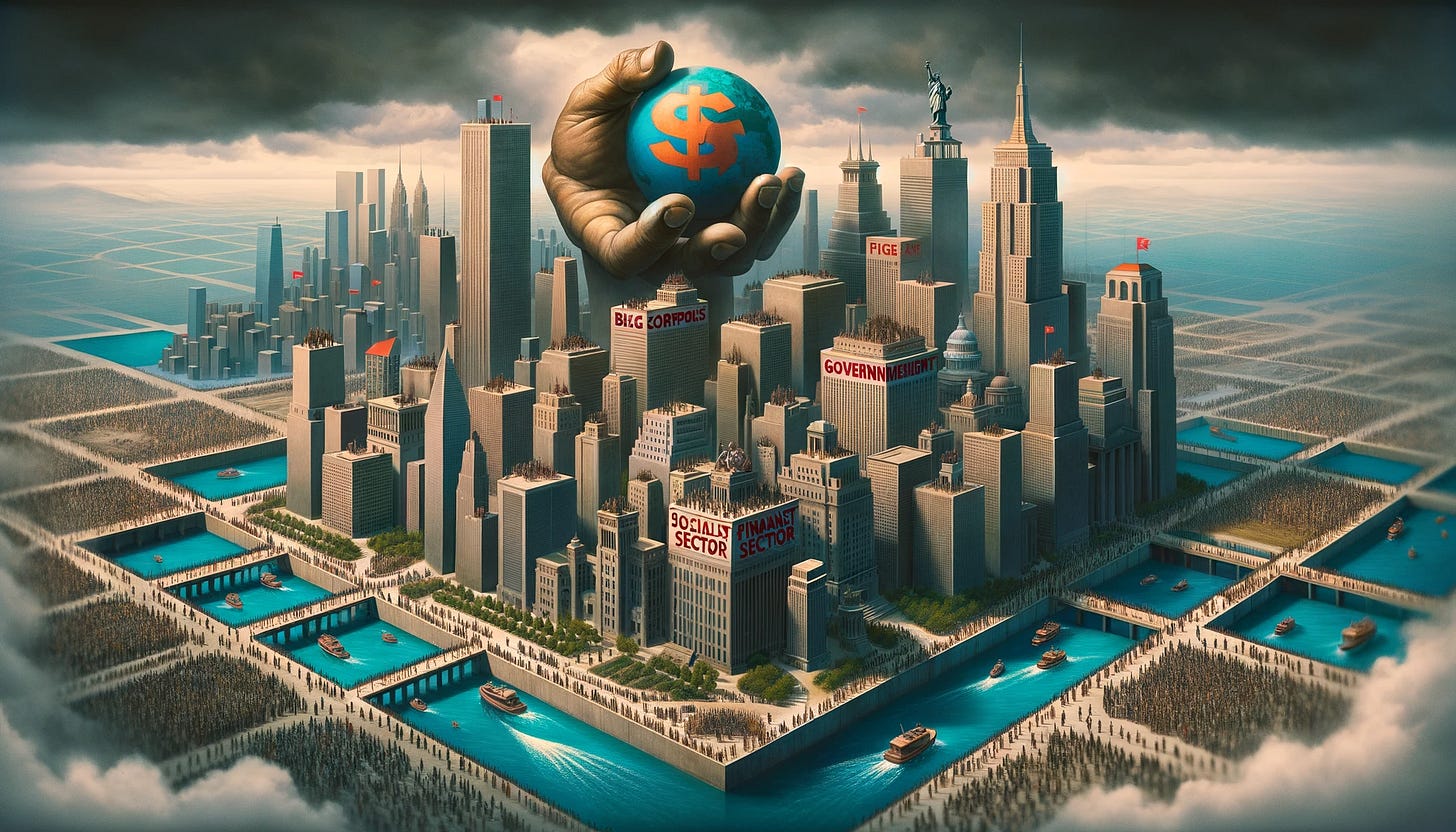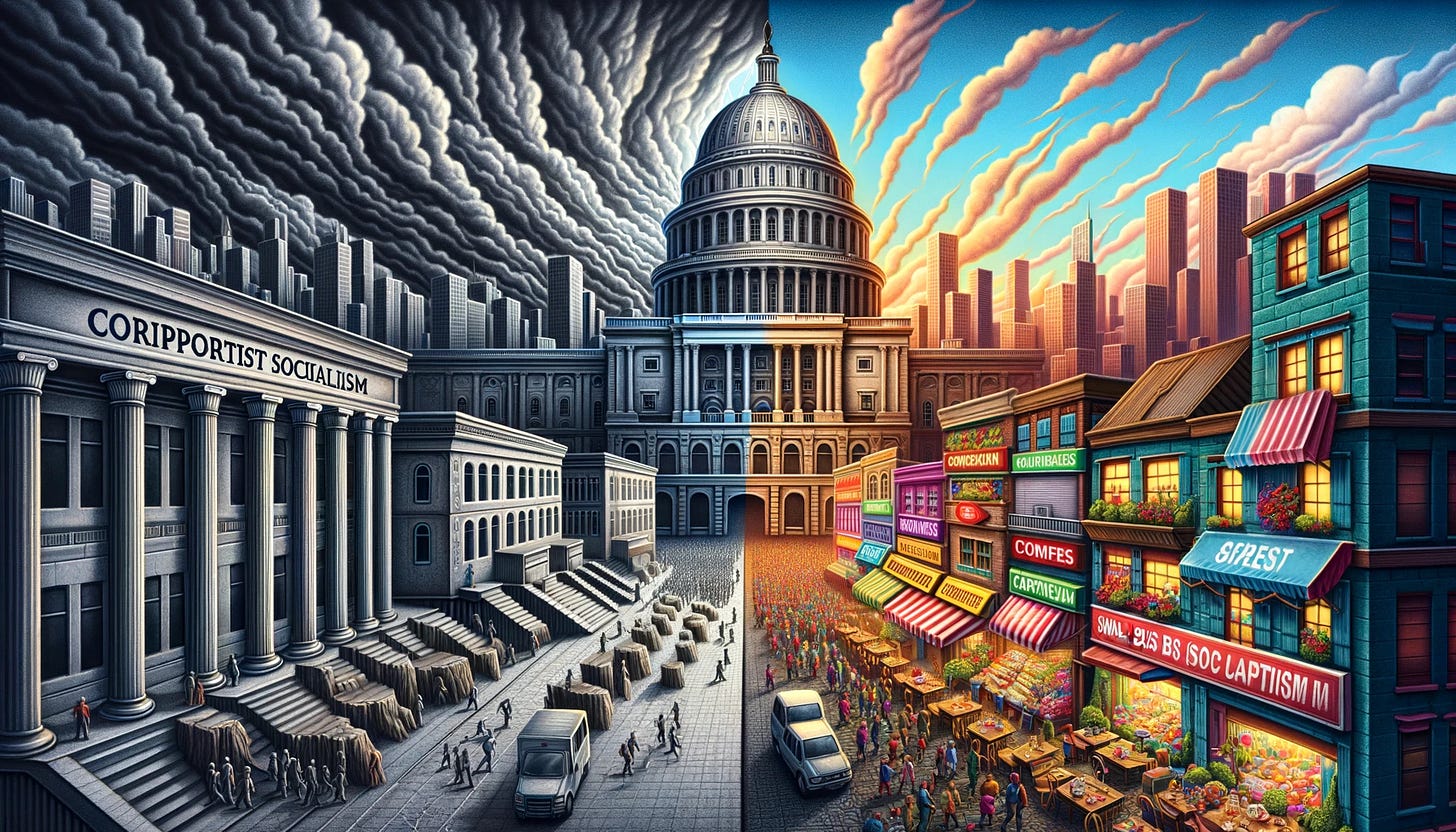Dear friend,
It’s time to reveal the truth behind what’s been parading as our capitalist economy in the West.
I say ‘parading’ quite emphatically because we actually don’t live in a capitalist economy. Not really.
The failures attributed to free enterprise are actually failings of ‘socialist corporatism’, a system that intertwines big corporations, the finance sector, and government, creating a powerful bloc that sidelines average citizens.
This power bloc dictates economic and professional opportunities, suppressing true free enterprise dynamics and mirroring control mechanisms found in communist and totalitarian regimes.
Corporations manipulate this system through lobbying and media control, while governments legislate and regulate in their favour, awarding them with bailouts, subsidies, and contracts.
The relationship between corporations and government is symbiotic, with a revolving door nature of employment between the two, leading to regulatory capture and failure to enforce laws on large corporations.
The solution lies in supporting small businesses and entrepreneurial capitalism, demanding politicians support the real drivers of the economy, and advocating for true economic freedom.
Capitalism is associated with the works of the philosopher Adam Smith but he actually never used or coined the term.
Instead, that term came from an obscure English novelist and was popularised by Satanist Karl Marx as a name for the system he wanted to smash.
The term was, almost from its beginning, a pejorative and still is used in such a manner.
A better term for the economic system of which Smith wrote is ‘free enterprise’ — the ability of every man to freely turn his creative or productive talents into something rewarded by others because they need or desire his creations or productions.
This could be something as simple but arduous as digging a hole right through to brain surgery or classical music composition.
Another term for this is the natural economy.
It is natural because we as humans, by nature, freely interact with one another and, in doing so, freely come to exchange our talents for the talents of others.
That’s free enterprise, plain and simple.
The system we operate in indeed has elements of free enterprise — every economic system does because it’s the natural way of doing things — but is well and truly perverted.
The so-called failures of free enterprise are actually the failings of ‘socialist corporatism’, a system that is not only the antithesis of free enterprise but a grotesque parody of the natural economy.
This system of socialist corporatism is a tangled web, intertwining big corporations, the finance sector, and government, creating a power bloc that sidelines the average citizen.
This power bloc dictates nearly all economic and professional opportunities in our system, leaving little room for true free enterprise dynamics.
In this distorted system, the concept of free enterprise is a mere illusion, masked by the intricate dance of these powerful players.
This system of socialist corporatism mirrors the control mechanisms of communist and totalitarian regimes, where opportunity is suppressed and allegiance is coerced.
It is a system where big government and big business rule the roost.
Corporations craft the rules through lobbying and buying political favour, they own the fake news legacy media and control media narratives, and they actively stifle new competition.
Governments — regardless of which political party is in power — legislate and regulate so that the rules favour corporations with their legion of corporate bureaucrats and lawyers, they give bailouts and massive subsidies to the likes of the banks, the aviation sector, and the auto sector, and they award lucrative taxpayer-funded contracts primarily to big corporations.
Economist John Kenneth Galbraith, a great proponent of socialist corporatism, said that the “great dialectic in our time is not, as anciently and by some still supposed, between capital and labor; it is between economic enterprise and the state.”
While it is true that anything that the state touches it ruins, the natural economy of free enterprise being a classic example of this, Galbraith was actually claiming that corporations and government stand in opposition to one another.
When you think about it, corporations are the child of the state, as it was governments who interfered in the free enterprise system by passing laws that allowed corporations to come into existence.
(Indeed, the Dutch East India Company is considered the first corporation in the world, and it was brought into being by government charter).
But today, it is clear government and corporations are not in opposition to one another, but, rather, they work for mutual benefit, like some bizarre symbiotic anomaly where two parasites feed off of each other. (Actually, they aren’t feeding off of each other; they’re feeding off of us!)
Consider the revolving door nature of employment when it comes to government and corporations.
In my time as an elected member of the House of Representatives in Australia, I lost count of the number of lobbyists or corporate bureaucrats who ended up getting employed as key officials in the offices of Cabinet ministers and vice versa.
How many politicians — from both sides of the partisan ledger — do you see joining the boards or the upper echelons of major corporations?
Firebrand United States presidential nominee Vivek Ramaswamy belled the cat on this during the recent Republican primary debate:
In general, I don’t think we want capitalism and democracy to share the same bed anymore. It’s time for a clean divorce. Let companies be companies but I don’t like the crony capitalism. This dates back a long time in both parties.
And I think that we need to end the lobbying, and I personally believe that if you have been working in the Government, you should not lobby that Government for ten years. If you have been a Government elected official, doing deals with companies, be they Boeing or be they pharmaceutical companies, you should not join the board of that company for 10 years after.
The former chairman of the FDA, the Commissioner of the FDA, ended up on the board of Pfizer. Nikki Haley did deals for Boeing and ends up on the board of Boeing. I don’t care if it is a Republican or Democrat, we need some basic principles that end the corruption in Government. That’s how we got the health insurance exemptions. That’s how we got the pharmaceutical liability exemptions. We need to end the corruption.
As Ramaswamy alludes to with his FDA/Pfizer example, the situation is worse in the public service than it is amongst the political class.
Government watchdog agencies — supposedly there to ensure big corporations comply with the law and do the right thing by their customers — are subject to regulatory capture.
Former industry insiders who wind up working for regulatory agencies, don’t want to upset their old buddies back at the companies they were once working in, while others in those same agencies don’t want to upset their future employers in the companies they’re supposed to be regulating.
The result is a failure to strictly enforce existing laws and regulations on large corporations, allowing them to operate with more freedom than smaller businesses, and with less regard for the public interest.
All of this criticism is not just academic speculation. There are real life examples of how socialist corporatism is playing out all around the Western world.
Take a look at the United States and the 2008 financial crisis.
Who were the real beneficiaries of the bailouts supported by George W. Bush and Barack H. Obama? The big banks and companies like General Motors, all saved by taxpayer money!
Small businesses, the true drivers of the American economy, were left to fend for themselves.
In the United Kingdom, the story is similar with their Private Finance Initiatives scheme.
Large companies profit enormously from running public services, but at what cost? The public ends up with higher expenses and subpar services.
In Australia, the banks also go a leg-up with the government passing legislation in 2018 which allowed for hybrid securities to be used as a form of bail-in for a bank should it come under financial distress.
This trend of socialist corporatism globally is an affront to anyone who believes in fair play.
It’s essentially a rigged game where only a few hold the winning cards, and the majority are mere bystanders.
But there is a way to counter all of this, and that is by rallying behind small business and entrepreneurial capitalism.
This is where the true essence of economic freedom lies — not in the corridors of power where deals are made to benefit the few at the expense of the many.
Real free enterprise is about free and fair competition and real innovation, not government bailouts and corporate handouts.
The path to a truly open, free, and natural economy, is where innovation is nurtured, and hard work is rewarded.
We need politicians who will shun those at the top of the corporate ladder, and support the real drivers of the economy.
The strategy for them should be clear: support local businesses, demand transparency and accountability from corporations and government, and encourage a culture that values and supports entrepreneurship.
As for you and I, we can personally fight back and reclaim our economy for the benefit of all, not just a select few.
Take a stand for true economic freedom: shop with small businesses.
Until next time, God bless you, your family and nation.
Take care,
George Christensen
George Christensen is a former Australian politician, a Christian, freedom lover, conservative, blogger, podcaster, journalist and theologian. He has been feted by the Epoch Times as a “champion of human rights” and his writings have been praised by Infowars’ Alex Jones as “excellent and informative”.
George believes Nation First will be an essential part of the ongoing fight for freedom:
“The time is now for every proud patriot to step to the fore and fight for our freedom, sovereignty and way of life. Information is a key tool in any battle and the Nation First newsletter will be a valuable tool in the battle for the future of the West.”
— George Christensen.
Find more about George at his www.georgechristensen.com.au website.










Same story with our system of governance. I’m wondering if we’ve ever lived in a true democracy. Always the lesser of two evils. What we truly need is a complete paradigm shift. Imagine if our governing bodies actually worked for the good of all instead of the few rich and powerful. What if we cooperated together to achieve this. Whoa. Hold on. That’s going to far….. then you’ve got to beleive that in all our hearts lie true goodwill and a caring for all of life. Jeez. The last famous guy who suggested that got strung up.
Aren’t we all born at the very least with a touch of goodness and a smattering of divine wisdom. Perhaps if that was cultivated maybe ……
Everyone’s out there celebrating a great man who had the temerity to suggest we should live in a loving way. Forgiving others errant behaviour and helping to lift us all up together. Shame we’re just stuck with Santa Claus and a bigger credit card debt to tide us over. Just about everywhere you look we picked the wrong turn.
Yep. Time for a true evolution.
Good article and some additional resources related to it that people will find helpful, including suggested solutions. I do not endorse the ALOR nor agree with their position on a number of things. Their library though has things that are difficult to find elsewhere. I think the one person who really captured how this globalist system works and its intent was the late and great Mr Jeremy Lee Australias foremost expert on the Globalist order. Unfortunately ALOR have removed all his content. I have linked one of his best presentations below with the ALOR library link. I strongly recommend Tragedy and Hope by Carrol Quigley as a definitive treatise on Globalism.
https://www.youtube.com/watch?v=Dk49WnrRZc4&t=1s
https://alor.org/Storage/navigation/Library6.htm